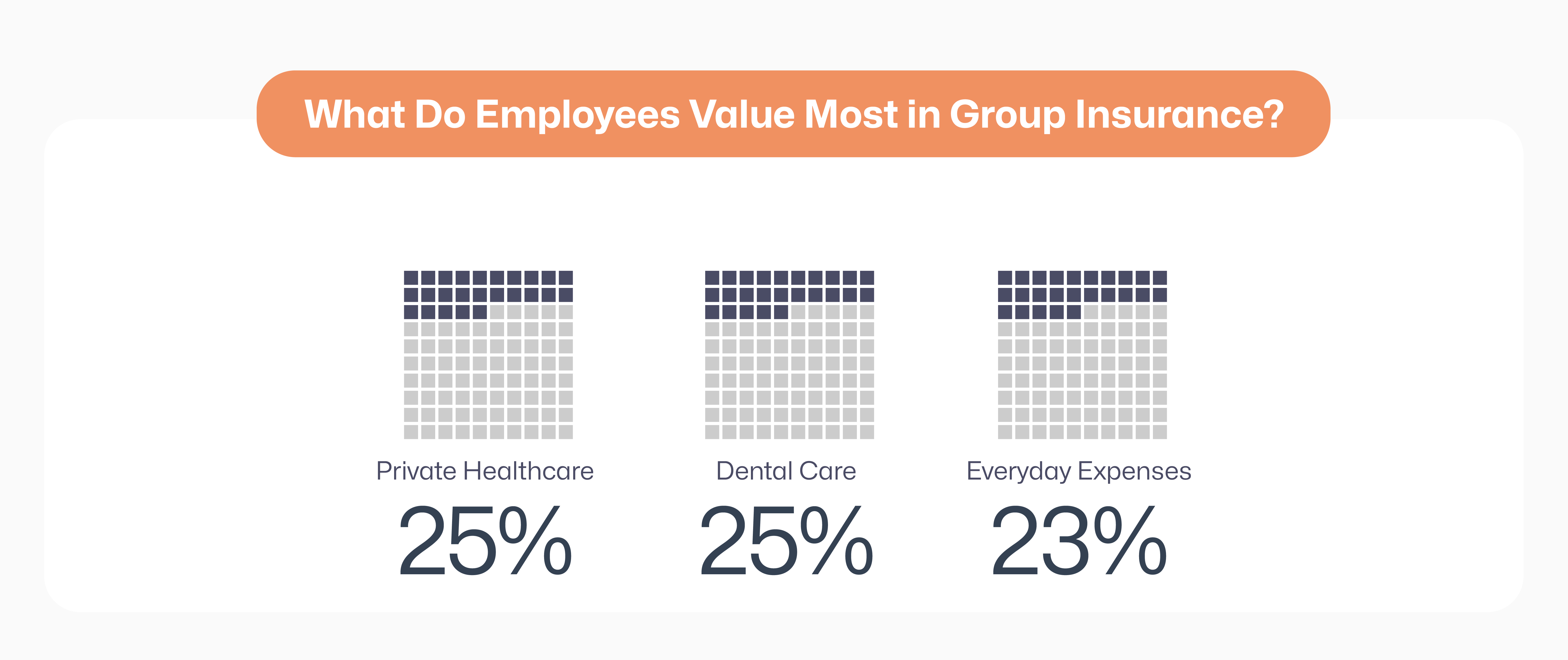Contents


A Deloitte survey found that 46% of Gen Z and 47% of Millennial employees live paycheque-to-paycheque. One of their primary concerns is the lack of funds to navigate medical emergencies. A group health insurance policy, taken by an organisation, can alleviate their concerns. Stronger employee benefits help people feel valued and boost their loyalty towards your company. As many as 75% of employees say they are open to switching to small or medium-sized enterprises if they offer better benefits than their current employer. Here’s a look at how health benefits can be instrumental in reducing employee churn in your company.
SMEs Must Get a Group Health Insurance Policy
Corporate insurance is a powerful investment for small and medium-sized companies to attract and retain employees. Establishing your image as an organisation that cares about people offers several benefits. A group health insurance policy can:
Build a Stronger Brand Image
Comprehensive healthcare plans help establish a culture of teamwork and generate goodwill. Offering group health insurance can establish your brand as one that cares for the well-being of its employees. Group insurance also conveys that the company does not discriminate between employees.
A positive reputation translates into lower talent acquisition costs. Employees who feel valued and supported at the workplace tend to remain more productive and engaged in achieving the organisation's goals.
Increase Talent Retention
Group insurance can be a valuable part of employee retention strategies among small and medium-sized organisations. A group health insurance policy provides employees with an additional safety net. A widespread practice in India is for individuals to use company insurance for more minor needs and gain no-claim benefits on their policies. Comprehensive insurance plans, therefore, offer more reasons for employees to stay with the company longer. This increases employee loyalty and lowers talent attrition.
Reduce Absenteeism
With medical facilities becoming more accessible, employees can pay greater attention to their health concerns. Timely medical attention prevents health issues from escalating. A happy and healthy workforce translates into a higher number of productive days. Specific insurance policies allow SMEs to extend employee benefits to their dependents. This reduces overall health-related emergencies, reducing absenteeism.
Benefits to the Organisation
While you may recognise that insurance can boost employee satisfaction and retention, here are a few more benefits:
Lower Premiums
As business insurance is pooled across a larger customer base, the risk distribution enables insurers to offer policies with lower per-person premiums. A mix of high and low-risk individuals spreads the risk across age groups and job roles. This helps average out the premium and makes it much more affordable for everyone. For instance, jobs of in-lab chemical industry employees may be significantly more hazardous than their sales counterparts. However, the organisation averages the costs out, depending on the plan.
Flexibility in Premium Payments
With InsurTech companies making inroads in group insurance, SMEs now have the option of choosing monthly subscription-based plans. SMEs, which typically have cashflow issues, greatly appreciate the flexibility of not having to make upfront, lumpsum payments. Also, these tech-driven solutions are agile enough to cover from very large to tiny teams at a low per-employee cost.
Tax Savings
In most cases, employers pay the premium for group insurance policies for all their employees. The premiums paid for employee insurance fall under business expenses, reducing the company's taxable income. If the company and the employee pay part of the group health insurance policy premiums, both can claim partial tax benefits.
Lower Administrative Costs
Small and medium-sized businesses can save significant operational and administrative costs with a single group insurance. Managing a single group health insurance is more cost-effective and time-efficient for administrators than individual employee insurance.
SMEs typically grow faster than larger companies. This may result in constantly changing team sizes. InsurTech solutions make it super easy to manage group insurance for such SMEs by allowing companies a dashboard to add and remove employees.
Choosing the Best Group Healthcare Plan
Did you know that hiring skilled employees got costlier and more time-consuming in 2023? While easy-to-fill roles take at least 14 days, more difficult-to-hire positions may remain vacant for up to 3 months. For smaller organisations, this affects business sustainability. Against this backdrop, having robust employee retention strategies can be a great business advantage. High employee churn not only adds to hiring costs but also increases training costs and hampers overall productivity. Research proves that benefits and work environment are more important factors than the organisation's size in determining employee commitment. For SMEs, this can be a differentiator, as it helps you position yourself as an employee-centric and progressive company, helping you attract more potential candidates.
Additional benefits beyond the monthly paycheque and paid leaves are critical considerations for employee retention strategies for SMEs. With 33% of employees claiming to be better engaged with the organisation that takes care of them, group insurance can boost collective productivity. There are several options at different premium levels. Choosing the most suitable group health insurance policy is critical for employee retention. Here's how you can ensure that your employee group healthcare plan addresses their requirements:
Set Aside a Budget
Decide on a budget considering the employee count, industry standards, and location-specific healthcare needs. Consider occupational health risks, as different jobs make employees vulnerable to unique health risks.
Weigh Your Options
Compare and understand different plans. Consider coverage, flexibility, customisability, and affordability. Also, consider out-of-pocket maximums, co-pays, and deductibles. Network accessibility is key to providing convenient and accessible healthcare.
Ask for Add-Ons
Family floaters, dental, vision, mental health services, and clinic visits are valuable add-ons. These are often missing from personal insurance. These could serve as points of differentiation while candidates consider joining or leaving your organisation.

Prioritise Flexibility
InsurTech solution providers have enabled companies to digitally manage group insurance from a dashboard. They can add and remove employees and adjust premiums with changing team sizes and industry needs. You can also create custom benefit packages for various employee groups within the organisation. When an employee leaves, their insurance benefits do not lapse. Instead, their plan is converted to individual health insurance, which ensures the optimal use of premiums and helps them access uninterrupted services.
Educate Employees
Offering a service is beneficial only if it is effectively implemented. SMEs must communicate and educate their employees about healthcare benefits and ways to avail them. Additionally, regular feedback and evaluations may help you align insurance benefits with the changing employee and business needs.
InsurTech solutions are particularly beneficial for SMEs. They allow smaller businesses access to affordable and flexible group insurance plans. SMEs can choose the desired coverage, including hospitalisation, at-home treatment, in-patient expenses, and day-care procedures. They can add and remove employees without affecting the cover limits and adjust premiums according to team size. InsurTech has also made the claims process seamless and efficient.
Bibliography (last accessed on Aug 30, 2024)
- https://www.tataaig.com/knowledge-center/group-health-insurance/is-group-health-insurance-cheaper-than-individual-health-insurance
- https://www.tataaia.com/blogs/msme/how-much-does-small-business-health-insurance-cost.html
- https://www.forbes.com/councils/forbesbusinesscouncil/2022/10/05/how-small-and-medium-sized-businesses-can-better-retain-their-employees/
- https://www.emerald.com/insight/content/doi/10.1108/IJOA-09-2023-3961/full/html
- https://www.prnewswire.com/news-releases/new-research-shows-that-hiring-is-harder-than-ever-time-to-hire-increasing-significantly-for-almost-all-roles-301839785.html
- https://www.onsurity.com/blog/why-companies-should-offer-health-insurance-to-employees/
- https://sme.icicilombard.com/blogs/group-health-insurance-for-employee-retention





